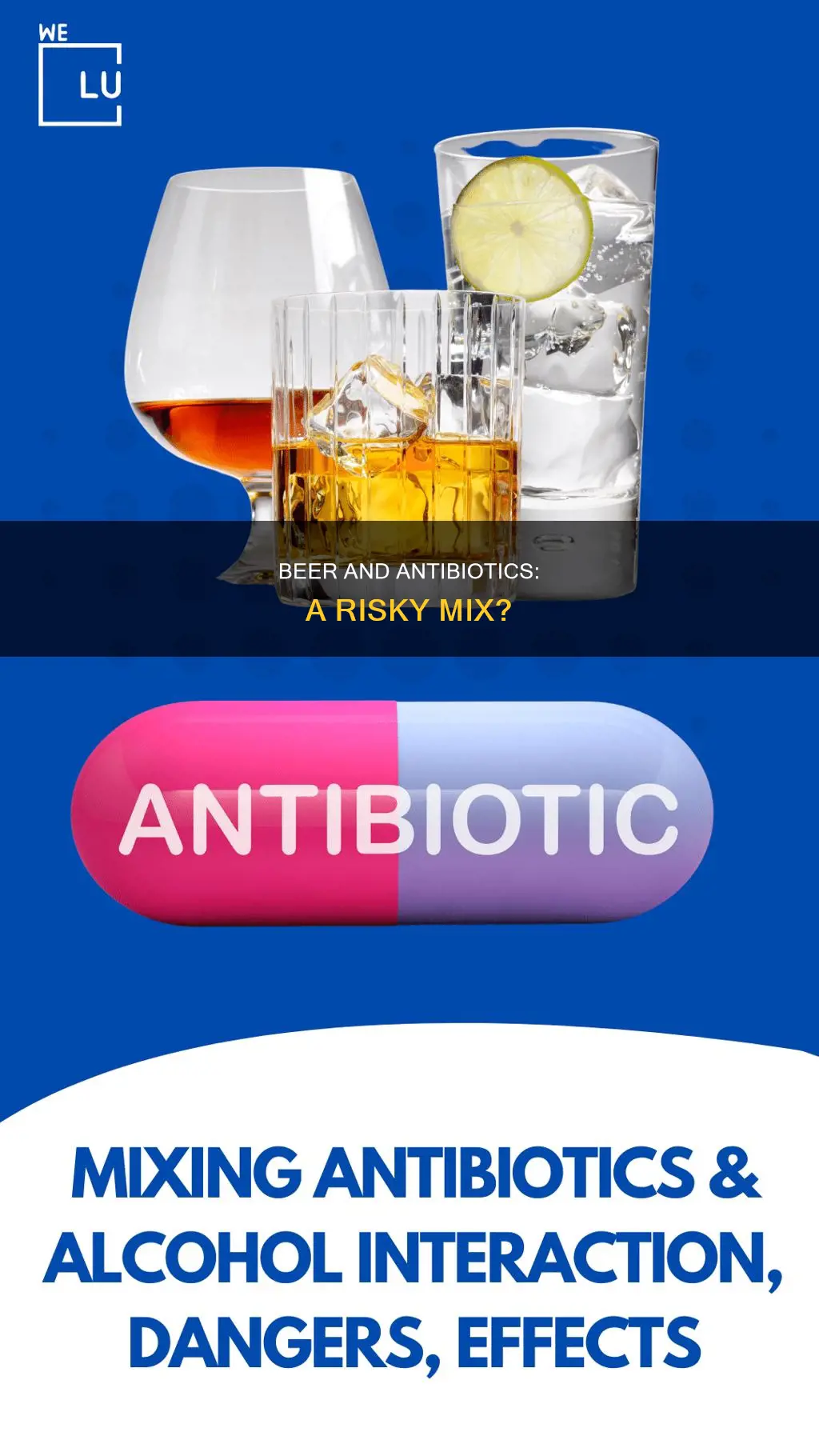
Drinking beer while on antibiotics is generally not recommended, as it can negatively impact your recovery process and cause unpleasant side effects. Alcohol can dehydrate you, disrupt your sleep, and hinder your body's ability to heal and fight infections. While moderate alcohol consumption usually doesn't reduce the effectiveness of most antibiotics, it can increase the likelihood of experiencing side effects, such as digestive issues, drowsiness, dizziness, and nausea. It's best to consult your doctor or pharmacist about the specific antibiotics you're taking and follow their advice on alcohol consumption during and after your treatment.
| Characteristics | Values |
|---|---|
| Effect on antibiotic effectiveness | Alcohol usually does not affect the effectiveness of antibiotics. However, it may increase the risk of certain side effects. Alcohol can also interfere with the body's ability to absorb some antibiotics, making them less effective. |
| Side effects | Alcohol can increase the risk of side effects from antibiotics, such as nausea, vomiting, stomach pain, flushing, liver damage, drowsiness, dizziness, digestive issues, and impaired cognitive function. |
| Recovery | Alcohol can negatively impact the recovery process by causing dehydration, disrupting sleep, and weakening the immune system. |
| Interactions with specific antibiotics | Metronidazole, tinidazole, cefoperazone, cefotetan, and ketoconazole are known to have potentially dangerous interactions with alcohol and should be avoided. Other antibiotics, such as penicillins, sulfonamides, and tetracyclines, may have less severe interactions. |
| Recommendations | It is generally recommended to avoid alcohol while on antibiotics. However, moderate alcohol consumption (1 drink for women, 2 drinks for men) is usually considered safe for most antibiotics. It is important to follow the advice of your doctor or pharmacist regarding alcohol consumption during antibiotic treatment. |
What You'll Learn
- Beer and antibiotics can both cause dehydration and upset stomachs
- Alcohol can hinder the body's natural healing process and lower your immune response
- Drinking beer while taking certain antibiotics can cause a dangerous disulfiram-like reaction
- Alcohol can cause antibiotic side effects such as drowsiness, dizziness and digestive issues to be amplified
- Drinking beer while taking antibiotics can cause liver damage

Beer and antibiotics can both cause dehydration and upset stomachs
Drinking beer while on antibiotics is not recommended, as it can lead to dehydration and upset stomachs, among other side effects.
Dehydration is a common issue when consuming alcohol, as it can interfere with the body's essential processes, such as sleep and hydration, which are critical components of recovering from an illness. Beer, in particular, is diuretic, which means it can increase the body's fluid output, leading to dehydration. This can be especially problematic when taking antibiotics, as the body is already working to recover from an infection.
Additionally, both beer and antibiotics can cause upset stomachs and digestive issues. Antibiotics are known to cause stomach or digestive side effects, and consuming beer or other alcoholic beverages can increase these feelings of nausea and gastrointestinal distress. Beer contains carbonation and hops, which can further irritate the stomach and contribute to digestive problems.
The combination of beer and antibiotics can also lead to other side effects, including drowsiness, dizziness, headaches, and impaired cognitive function and concentration. It is important to note that the specific side effects will vary depending on the type of antibiotic, the amount of alcohol consumed, and the individual's health status.
To avoid these potential issues, it is generally recommended to refrain from consuming beer or other alcoholic beverages while taking antibiotics. It is always best to consult with a healthcare professional to understand the potential interactions and risks associated with mixing beer and antibiotics.
Beer and Oral Thrush: Is There a Connection?
You may want to see also

Alcohol can hinder the body's natural healing process and lower your immune response
It is widely known that alcohol can disrupt sleep patterns and deprive us of the restorative benefits of a good night's rest. When the body is fighting an infection, it needs quality sleep to aid the recovery process. Drinking alcohol before bed can disrupt this, reducing the body's ability to heal and leaving you feeling more tired and run down. This is especially true if you're already feeling unwell and your body is working overtime to recover. Additionally, alcohol can directly impact the immune system, making it less effective at fighting off infections. This is because alcohol can reduce the body's ability to produce new white blood cells, which are essential for protecting the body against foreign invaders, such as bacteria and viruses. A decrease in white blood cell count can leave you more susceptible to getting sick and can also prolong your recovery time.
The impact of alcohol on the immune system is twofold. Not only does it reduce the body's ability to produce new white blood cells, but it can also hinder the function of existing ones. White blood cells are like the soldiers of our immune system, and when we drink alcohol, their ability to carry out their duties is impaired. They may not be able to move as quickly to the site of an infection, and even when they do arrive, their ability to fight off the invading bacteria or virus is diminished. This means that not only is our body producing fewer white blood cells, but the ones we do have are less effective at protecting us. As a result, we're left more vulnerable to the threat of infection, and our recovery time is significantly increased.
Furthermore, alcohol can also disrupt the delicate balance of microorganisms in your gut, often referred to as your gut flora or microbiome. A healthy gut contains a diverse range of bacteria, many of which have beneficial effects on our health, including aiding digestion and supporting our immune system. Drinking alcohol can disturb this balance, reducing the number of beneficial bacteria and promoting the growth of harmful ones. This imbalance can have negative consequences for your immune health, as a significant portion of your immune system is located in your gut. A healthy gut contributes to a strong immune system, so anything that upsets this balance can leave you more susceptible to illness and prolong the healing process.
While enjoying the occasional drink may not cause significant harm, excessive alcohol consumption can have a detrimental effect on your body's ability to heal and recover. This is especially true when combined with antibiotics, as both work against each other. Antibiotics are designed to kill off harmful bacteria causing an infection, but they can also inadvertently impact the good bacteria in your gut. Drinking alcohol while taking antibiotics can further disrupt this balance, potentially leading to digestive issues, nutrient deficiencies, and a weakened immune system. It's important to give your body the best chance to heal and recover, so it's advisable to avoid alcohol while taking antibiotics and to focus on supporting your body's natural healing process through adequate rest, hydration, and a nutritious diet.
Beer Ads and Drinking: Is It Allowed?
You may want to see also

Drinking beer while taking certain antibiotics can cause a dangerous disulfiram-like reaction
A disulfiram-like reaction is one of the most common alcohol and antibiotic interactions. It occurs when alcohol is combined with certain antibiotics, such as metronidazole (Flagyl), which is used to treat various infections, including those in the stomach, intestine, skin, joints, and lungs. This reaction can also occur with other antibiotics like cefotetan (Cefotan) and tinidazole (Tindamax).
The symptoms of a disulfiram-like reaction can include flushing of the skin, stomach cramps, vomiting, and difficulty breathing. These symptoms can be severe and require immediate medical attention. It is crucial to avoid alcohol while taking these antibiotics and for at least 72 hours after stopping the medication.
Drinking beer or other alcoholic beverages while taking these antibiotics can lead to a dangerous interaction, as beer contains alcohol, which can trigger this reaction. It is important to note that even small amounts of alcohol, such as those found in some mouthwashes and cold medications, should be avoided when taking these antibiotics.
In addition to the risk of a disulfiram-like reaction, consuming alcohol while on antibiotics can also interfere with the body's healing process. Alcohol can disrupt sleep, dehydrate the body, and hinder the absorption of vital nutrients, all of which can slow down recovery from an infection. Therefore, it is generally recommended to avoid alcohol while taking antibiotics to ensure optimal healing and recovery.
Mixing Beer and Red Wine: A Good Idea?
You may want to see also

Alcohol can cause antibiotic side effects such as drowsiness, dizziness and digestive issues to be amplified
Drinking alcohol while on antibiotics is not recommended. Although moderate alcohol consumption does not usually affect the effectiveness of most antibiotics, it can cause a range of negative side effects.
Alcohol can cause drowsiness, dizziness, and digestive issues, which are also common side effects of antibiotics. Consuming alcohol while on antibiotics can amplify these side effects, leading to increased drowsiness, dizziness, and digestive problems such as nausea, vomiting, and stomach pain.
Additionally, alcohol can hinder the body's natural healing process by disrupting sleep patterns and increasing dehydration. It can also interfere with the absorption of vital nutrients, affecting your energy levels and immune system. As a result, drinking alcohol while on antibiotics can slow down your recovery from an illness or infection.
Furthermore, alcohol can negatively impact liver function, digestion, and heart health. It can also weaken the immune system, making it easier to pick up other illnesses.
Therefore, it is generally advised to avoid alcohol during the course of antibiotic treatment to ensure optimal recovery and minimize the risk of adverse side effects.
Beer and Cancer: What's Safe to Drink?
You may want to see also

Drinking beer while taking antibiotics can cause liver damage
When you drink alcohol, your liver is responsible for filtering and breaking down the alcohol in your bloodstream. Excessive alcohol consumption can overwhelm the liver, causing a build-up of fat, inflammation, and scarring. This build-up of fat in the liver is known as alcoholic fatty liver disease and is the first stage of ARLD. While this stage is usually reversible if one stops drinking, prolonged alcohol misuse can lead to more severe forms of ARLD, such as alcoholic hepatitis and cirrhosis.
Drinking beer while taking antibiotics can further increase the risk of liver damage. Some antibiotics, when mixed with alcohol, can lead to side effects such as nausea, vomiting, stomach pain, and liver damage. Additionally, alcohol can interfere with the way antibiotics are metabolized in the body, potentially reducing their effectiveness or increasing their toxicity.
The combination of alcohol and antibiotics can also cause a "disulfiram-like reaction", which includes symptoms such as flushing of the skin, stomach cramps, vomiting, and difficulty breathing. This reaction is particularly associated with antibiotics such as metronidazole (Flagyl), tinidazole (Tindamax), and cefotetan (Cefotan).
To avoid the risk of liver damage, it is generally recommended to avoid drinking alcohol while taking antibiotics. It is important to follow the instructions provided by your healthcare provider and check for any potential drug interactions. If you choose to drink beer while taking antibiotics, it is crucial to do so in moderation and always consult your doctor or pharmacist first.
In conclusion, drinking beer while taking antibiotics can indeed cause liver damage. The combination of alcohol and antibiotics can lead to side effects, interfere with the effectiveness of the antibiotics, and increase the risk of liver-related problems. Therefore, it is generally advisable to avoid mixing alcohol and antibiotics to ensure your safety and well-being.
Beer Ads: Drinking on the Job?
You may want to see also
Frequently asked questions
Drinking beer while on antibiotics can cause a range of side effects, including nausea, drowsiness, dizziness, digestive issues, and vomiting. It can also slow down the absorption of the antibiotic, hinder recovery by causing dehydration, and lower your immune response. In some cases, it can lead to more severe reactions, such as liver damage, chest pain, and heart palpitations.
It is generally recommended to avoid drinking beer or any other type of alcohol while on antibiotics. However, consuming alcoholic beverages that are low in tyramine, such as bottled beers or home-brewed beer, is considered safe while taking oxazolidinones, a class of antibiotics used for pneumonia, severe skin infections, and other serious conditions.
Metronidazole (Flagyl) and Tinidazole (Tindamax) are antibiotics that should never be mixed with alcohol. Combining these antibiotics with alcohol can lead to a potentially dangerous "disulfiram-like reaction," which includes symptoms such as abdominal cramps, nausea, vomiting, headaches, flushing, and difficulty breathing. It is recommended to avoid alcohol during treatment and for at least 72 hours after stopping these medications.







